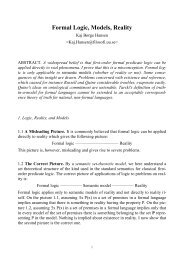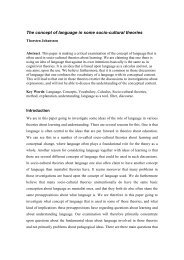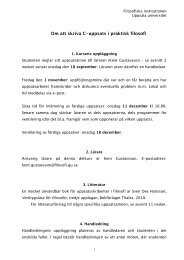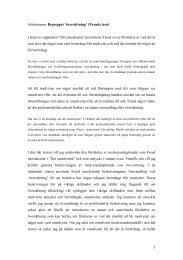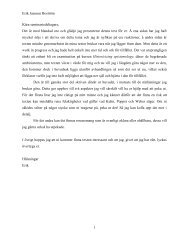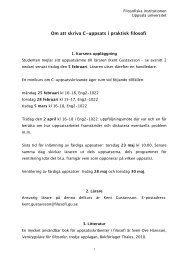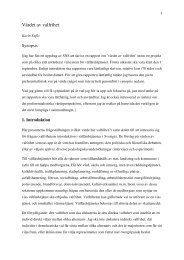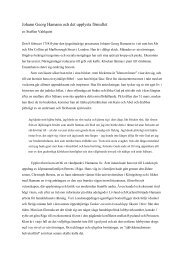1 Dewey, Wittgenstein, and Linguistic Instrumentalism My paper ...
1 Dewey, Wittgenstein, and Linguistic Instrumentalism My paper ...
1 Dewey, Wittgenstein, and Linguistic Instrumentalism My paper ...
Create successful ePaper yourself
Turn your PDF publications into a flip-book with our unique Google optimized e-Paper software.
immediate goods that obtain among men is not a fact of philosophy, but of<br />
nature <strong>and</strong> life (LW 1: 305-306).<br />
It is not easy to find anything so bold <strong>and</strong> broad in <strong>Wittgenstein</strong>, although I sense its<br />
presence. He is a far more encompassing philosopher than many of his followers<br />
appreciate.<br />
Oftentimes in the Tractatus <strong>Wittgenstein</strong> seems to think that all there is to<br />
philosophy is the logical clarification of propositions, which function as pictures of<br />
reality. If a proposition is incapable of picturing reality, it is nonsense. Logic itself<br />
cannot discover empirical truths only distinguish sense from nonsense. There is much<br />
more that we may show, but never say. Once we complete the task of the logical<br />
clarification of propositions, there is no more work for philosophy to perform.<br />
Therefore, the earlier <strong>Wittgenstein</strong> thought he had brought philosophy to an end with<br />
the publication of the Tractatus. After the critiques of Frank Ramsey <strong>and</strong> others,<br />
<strong>Wittgenstein</strong> ab<strong>and</strong>oned this position. It increased the scope of what he considered<br />
philosophy.<br />
Many analytic philosophers <strong>and</strong> those in the ordinary language tradition read<br />
the Philosophical Investigations as clarifying philosophical (i.e., not empirical) problems<br />
<strong>and</strong> thereby relieving us from the bewitchment of language that, among other things,<br />
leads us to assume that words always have a reference. They assume we may establish<br />
normative logico-grammatical conceptual truths constitutive of any empirical<br />
propositional truth within a language game. Often, they confine themselves to<br />
investigating the proper rule-governed use of language. While no doubt correct as far as<br />
it goes, such a reading of the later <strong>Wittgenstein</strong> results in a logico-grammatical<br />
transcendentalism that underst<strong>and</strong>s the role of philosophy in much the same way as the<br />
Tractatus. Some accept this formal transcendentalism <strong>and</strong> combine it with an almost<br />
mystical transcendentalism about the meanings that transcend the limits of langua ge.<br />
<strong>Dewey</strong>ans reject all form versus content dualisms <strong>and</strong> all forms of transcendental (e.g.,<br />
Kant) or transcendent (e.g., Plato) philosophy. However, they do agree that there is a<br />
great deal that transcends conceptual containment (e.g., the New Engl<strong>and</strong><br />
Transcendentalists). We only need to exp<strong>and</strong> the scope of philosophy to include extralinguistic<br />
underst<strong>and</strong>ing <strong>and</strong> appreciation to bring <strong>Wittgenstein</strong> <strong>and</strong> <strong>Dewey</strong> into<br />
agreement.<br />
For <strong>Dewey</strong>, all sentient beings have completely anoetic experiences that<br />
transcend the limits of language. Further, there is “immanent meaning” or what he<br />
more frequently calls “sense” meaning, that assumes but surpasses linguistic reference.<br />
<strong>Dewey</strong> thought we could not fully underst<strong>and</strong> the meaning of a proposition without<br />
appreciating it qualitatively, emotionally, <strong>and</strong> in embodied (habitual) action. <strong>Dewey</strong><br />
asserts: “A universe of experience is the precondition of a universe of discourse.<br />
Without its controlling presence, there is no way to determine the relevancy, weight or<br />
coherence of any designated [conceptual] distinction or relation” (LW 12: 74).<br />
“Experience” is <strong>Dewey</strong>’s word for all that occurs when any sentient creature such as<br />
ourselves trans-acts with other events in the universe. When we experience, we<br />
experience existence whence we m ay construct meaning <strong>and</strong> knowledge. We must<br />
24



